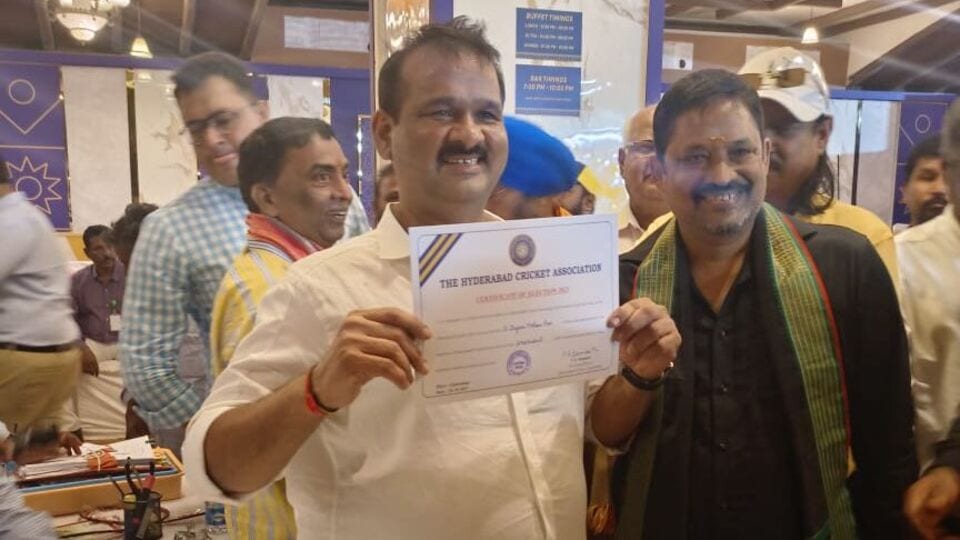Special Correspondent
Hyderabad cricket is bleeding—not on the field, but in the boardroom. For more than two decades, the Hyderabad Cricket Association (HCA) has been systematically looted by a nexus of politicians, ex-cricketers turned power brokers, and their cronies. What was once a platform to produce Test stars is now an empire of scams. The latest ₹4-crore “club disbursement scandal” is only the newest entry in HCA’s Hall of Shame, but its brazenness exposes how deep the rot runs.
The facts are shocking. Over 200 clubs were suddenly “blessed” with ₹5–6 lakh each. Far from empowering grassroots cricket, this largesse has all the markings of a laundering operation. Banks are now calling up club officials to return the money, raising the obvious question: who ordered these transfers? All fingers point to HCA President Jaganmohan Rao and his Apex Council partners in crime, who allegedly engineered the payout with the blessings of a powerful political backer.
Curiously, Secretary Devraj Ramchander—though arrested—was reportedly not even a signatory to this decision. The move is believed to have been taken solely by the suspended and now bailed President Jaganmohan Rao. His own election victory remains tainted: he scraped through by just one vote, a result shrouded in mystery since the defeated candidate chose not to demand a recount or take the matter to court.
Meanwhile, whispers across the city are growing louder. An influential Congress heavyweight, known for bending institutions at will, is said to be shielding the culprits. This would explain why the CB-CID, despite multiple complaints and damning evidence, remains a mute spectator. Why has such a high-value scam not led to immediate arrests or forensic audits? Why is the state government sitting idle while central agencies close in?

The Enforcement Directorate (ED), in contrast, has been actively probing earlier HCA scams—land grab deals, inflated contracts, fake bills, and proxy club registrations. Several members of past administrations have already faced questioning. Former president, for instance, was accused of diverting association funds to cover losses in his real estate ventures. Another former Indian spinner, who had sway in the HCA administration, allegedly used his clout to run a club empire through proxies, violating Lodha Committee reforms. Yet, year after year, these cases fade into silence because political patrons pull the strings.
The current ₹4-crore scandal cannot be dismissed as just another “clerical error.” It reeks of conspiracy, fraud, and deliberate cheating. Under the Indian Penal Code, such an act qualifies as criminal breach of trust, cheating, and conspiracy. Add to this the Prevention of Corruption Act, and the matter squarely falls into the category of prosecutable financial crime. If the CB-CID continues to drag its feet, the ED and CBI will inevitably step in. And when they do, the political umbrella shielding today’s Apex Council will not be strong enough.
It is no secret that an agent of a former TRS minister played a decisive role in building this corrupt ecosystem. Today, this very fixer is said to have conveniently switched loyalties and found a “Congress shelter” to escape scrutiny. The script is familiar: jump ship, find political patronage, and buy time until the heat dies down. But time is running out. The investigators know where to look, and the people of Hyderabad know who has been looting their cricket for decades.
Let us not mince words: the HCA was not looted; it was plundered. Money meant for infrastructure, coaching and young players was siphoned off to fund personal empires, buy land, or grease political wheels. The greatest tragedy is not just the loss of money—it is the loss of opportunities for hundreds of talented cricketers whose careers were crushed under the weight of dirty politics.
Hyderabad cricket deserves a clean slate. Nothing short of a court-monitored forensic audit, followed by prosecutions of guilty officials, will restore faith. The Apex Council must be dissolved, its members investigated, and lifetime bans imposed on those found guilty. For once, the BCCI must show spine and intervene, rather than allowing another state association to rot in corruption.
The question is simple: will Hyderabad cricket remain the personal ATM of fixers and politicians, or will the game be rescued from their grip? Time will tell. But if justice is delayed any further, Hyderabad risks losing not just its cricketing credibility, but its very soul.






